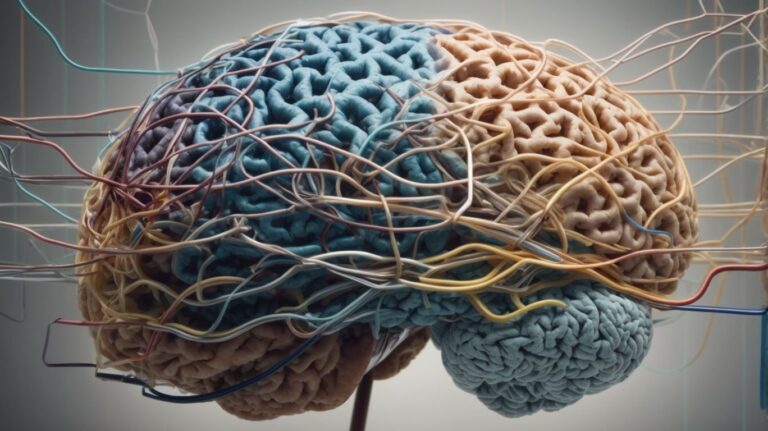Have you ever wondered what are the universal truths in psychology and how they can benefit us? In this article, we will explore the basic principles of psychology, the different psychological perspectives including biological, behavioral, cognitive, humanistic, psychodynamic, and sociocultural perspectives.
We will also discuss the commonalities among these perspectives such as the influence of genetics and environment, the importance of behavior and mental processes, and the role of individual differences. Stay tuned to learn how understanding these universal truths can help us in understanding and treating mental health issues.
Contents
- 1 What Are Universal Truths in Psychology?
- 2 What Are the Different Psychological Perspectives?
- 3 What Are the Commonalities Among Different Psychological Perspectives?
- 4 How Can Understanding Universal Truths Across Psychological Perspectives Benefit Us?
- 5 Frequently Asked Questions
- 5.1 What are the universal truths across psychological perspectives?
- 5.2 Why is it important to understand the universal truths across psychological perspectives?
- 5.3 What are some examples of universal truths across psychological perspectives?
- 5.4 How do these universal truths differ from the specific theories within each psychological perspective?
- 5.5 Are there any conflicting universal truths across psychological perspectives?
- 5.6 How can understanding universal truths across psychological perspectives benefit individuals and society?
What Are Universal Truths in Psychology?
Exploring universal truths in psychology delves into the fundamental principles and concepts that underpin human behavior, emotions, and cognition across diverse contexts and cultures.
These universal truths serve as the foundation upon which psychologists build their understanding of individuals and societies. They help explain why certain behaviors are pervasive across different populations despite variances in upbringing, environment, and societal norms. Emotional responses, such as fear, joy, and sadness, are also rooted in these universal truths, reflecting commonalities in the human experience.
What Are the Basic Principles of Psychology?
Understanding the basic principles of psychology provides a foundation for comprehending human behavior, cognition, and emotions, guiding us in exploring the intricate workings of the mind and its impact on behavior.
Perception, a fundamental component of psychology, refers to how individuals interpret and organize sensory information to create coherent mental representations of the world around them. This process heavily influences our understanding of reality and shapes our responses to stimuli.
When looking into the realm of memory, we uncover the fascinating storage and retrieval mechanisms that play a crucial role in shaping our identities and influencing our future decisions.
Learning, another pivotal concept in psychology, encompasses the acquisition of new knowledge or skills through various methods such as conditioning, observation, and practice.
What Are the Different Psychological Perspectives?
The diverse psychological perspectives offer unique lenses through which to understand human behavior, encompassing biological, behavioral, cognitive, humanistic, psychodynamic, and sociocultural approaches that collectively contribute to a comprehensive understanding of the human psyche.
Each perspective brings its own set of core principles, methodologies, and applications to the field of psychology. For instance, the biological perspective emphasizes the role of genetics and neuroscience in shaping behavior, while the behavioral approach focuses on observable actions and responses to stimuli. In contrast, the cognitive viewpoint explores how mental processes such as perception and memory influence behavior. The humanistic perspective emphasizes individual growth and self-actualization, while the psychodynamic approach delves into unconscious drives and conflicts. The sociocultural perspective examines how cultural norms and societal influences impact behavior.
Biological Perspective
The biological perspective in psychology focuses on the physiological processes, genetic influences, and neurobiological mechanisms that shape human behavior, emphasizing the intricate interplay between biology and psychology in understanding the complexities of the mind.
Genetics play a crucial role in the biological perspective, as they dictate the traits and predispositions individuals inherit from their parents. These genetic influences can impact everything from personality traits to susceptibility to mental health disorders.
Understanding how these genes are expressed and interact with environmental factors is key to unraveling the mysteries of human behavior. The brain, the command center of the body, controls our thoughts, emotions, and actions through its complex network of neurons and synapses.
Behavioral Perspective
The behavioral perspective in psychology focuses on observable behaviors, conditioning processes, and environmental stimuli that influence human actions, offering insights into learning, reinforcement, and behavioral modification.
Operant conditioning, a key concept in behavioral psychology, explains how behaviors can be modified through consequences, such as reinforcement or punishment.
Classical conditioning, another influential theory, highlights the association between stimuli and responses, shaping behavior over time.
Behaviorism, a foundational approach in psychology, emphasizes the importance of studying actions rather than mental processes, paving the way for understanding complex human behaviors and motivations.
Cognitive Perspective
The cognitive perspective in psychology explores mental processes, information processing, and cognitive schemas that shape human perception, memory, and problem-solving abilities, shedding light on how individuals interpret and interact with the world around them.
When examining cognition within the context of psychology, it becomes evident that our brains are sophisticated information processors, constantly encoding, storing, and retrieving data to make sense of our environment. Memory plays a crucial role in this process by allowing us to recall past experiences and learn from them, influencing our future decisions. Moreover, decision-making involves complex cognitive processes where individuals assess different options and outcomes before making a choice, reflecting their values, beliefs, and past experiences. Effective problem-solving strategies also stem from cognitive functions, enabling us to analyze situations, generate solutions, and evaluate their effectiveness.
Humanistic Perspective
The humanistic perspective in psychology emphasizes human potential, self-actualization, and personal growth, focusing on individual experiences, emotions, and aspirations in fostering self-acceptance, creativity, and fulfillment.
In understanding the core principles of humanistic psychology, it is crucial to delve into Maslow’s hierarchy of needs, which illustrates the hierarchy of human needs from basic physiological requirements to the pinnacle of self-actualization.
This theory postulates that individuals strive to meet these needs in a progressive order, starting with the most basic needs like food and shelter before advancing to higher-order needs for esteem and self-fulfillment. You can click here to understand the universal truths across psychological perspectives.
Moreover, Carl Rogers‘ person-centered therapy plays a significant role in humanistic psychology by highlighting the importance of creating a supportive and empathetic environment for personal growth and self-discovery.
Psychodynamic Perspective
The psychodynamic perspective in psychology delves into unconscious motives, childhood experiences, and intrapersonal conflicts that shape personality development, highlighting the impact of the unconscious mind, defense mechanisms, and psychoanalytic theory on human behavior.
Sigmund Freud, often considered the father of psychoanalysis, introduced influential concepts like the id, ego, and superego, emphasizing the role of early childhood experiences in shaping adult personality. Within the psychodynamic framework, the unconscious mind governs much of our behavior, with repressed thoughts and desires influencing everyday actions without our conscious awareness.
Psychoanalytic therapy, a cornerstone of this perspective, aims to uncover these unconscious conflicts through techniques like dream analysis, free association, and transference. By exploring these deep-rooted issues, individuals can gain insight into their inner struggles and work towards resolving longstanding psychological challenges.
Sociocultural Perspective
The sociocultural perspective in psychology examines the influence of societal norms, cultural practices, and social institutions on individual behavior, cognition, and identity formation, emphasizing the interconnectedness between culture, society, and psychological processes.
This approach highlights how cultural beliefs and values shape our perceptions, attitudes, and even our understanding of the self. It delves into topics like the role of language in shaping thought patterns, the impact of social norms on behavior, and the ways in which individuals from diverse cultural backgrounds navigate the world. Cultural psychology sheds light on how cultural contexts influence emotion expression, communication styles, and interpersonal relationships, offering valuable insights into the complexities of human experience and interaction.
What Are the Commonalities Among Different Psychological Perspectives?
Despite their diverse approaches, psychological perspectives share commonalities in acknowledging the interplay of genetics and environment, the significance of behavior and mental processes, the role of individual differences, the impact of culture and society, and the focus on mental health issues in understanding and addressing human behavior.
When examining the genetic-environment interactions, psychologists delve into how our inherited traits and experiences shape our behavior and mental health outcomes.
Individual variations are key in psychology, as understanding that each person is unique helps in tailoring interventions and therapies effectively. Cultural influences play a crucial role in shaping our perceptions and social behaviors, impacting how we make sense of the world around us and interact with others.
The Influence of Genetics and Environment
The interaction between genetics and environment plays a crucial role in shaping human behavior, emotions, and cognitive processes, highlighting the complex interplay between biological predispositions and environmental factors in psychological development.
When exploring the nature versus nurture debate, psychologists study how inherent genetic traits interact with external influences to mold an individual’s psychological makeup. Studies have delved deep into the realm of gene-environment interactions, seeking to understand how genes can mediate responses to various environmental triggers. The fascinating field of epigenetics sheds light on how environmental factors can influence gene expression and subsequent behavior, illustrating the intricate dance between DNA and experience in shaping our minds and actions.
The Importance of Behavior and Mental Processes
Behavior and mental processes are integral components in psychology, offering insights into human actions, cognitive functions, emotional responses, and decision-making processes that collectively shape behavior and personality.
Studying behavior allows psychologists to comprehend how individuals interact with their environment, make choices, and adapt to various situations. Through exploring cognition, from memory and problem-solving to language acquisition, researchers gain a deeper understanding of mental processes.
Moreover, motivation plays a crucial role in driving behavior, influencing goal-setting, persistence, and achievement. Understanding the intricacies of emotion helps in interpreting how individuals express feelings and react to stimuli, highlighting the interconnected relationship between mental states and actions.
Perception, the process of organizing sensory information, shapes how individuals interpret and respond to the world around them, shedding light on individual differences in behavior and thought processes.
The Role of Individual Differences
Individual differences in personality, behavior, and cognitive abilities contribute to the unique traits and characteristics that define human diversity, underscoring the importance of recognizing and understanding variations in psychological functioning and expression.
Personality traits, such as openness, conscientiousness, extraversion, agreeableness, and neuroticism, play a significant role in shaping how individuals perceive and interact with the world around them. These traits are often assessed using tools like the Big Five Inventory or Myers-Briggs Type Indicator.
Similarly, intelligence, encompassing aspects like reasoning, problem-solving, and creativity, varies widely among individuals and can be measured through IQ tests or other cognitive assessments.
Temperament, which refers to innate emotional and behavioral tendencies, influences how individuals respond to stimuli and navigate social situations. Understanding these differences can lead to more effective communication and conflict resolution strategies.
The Impact of Culture and Society
Culture and society exert a profound influence on human behavior, values, beliefs, and social norms, shaping individual identity, interpersonal relationships, and psychological well-being within diverse cultural contexts. Understanding the Universal Truths Across Psychological Perspectives
Our cultural identity is deeply intertwined with our psychological makeup, as it affects how we perceive ourselves and others, guiding our attitudes and behaviors. Social norms, dictated by cultural values and traditions, define acceptable behavior within a society. Multiculturalism, the coexistence of different cultural groups, enriches our understanding of psychological diversity and fosters tolerance and empathy.
Cultural psychology explores how culture shapes cognition, emotion, and behavior, highlighting the interconnectedness of culture and psychological processes. Psychological adaptations, influenced by cultural contexts, help individuals navigate social complexities and cope with diverse challenges.
The Focus on Understanding and Treating Mental Health Issues
Understanding and addressing mental health issues is a central aspect of psychology, emphasizing the importance of diagnosis, intervention, and therapy in promoting psychological well-being, resilience, and recovery.
This involves a wide array of mental disorders such as anxiety, depression, schizophrenia, and bipolar disorder, which require tailored therapy approaches to cater to the unique needs of individuals. Through various therapeutic modalities like cognitive-behavioral therapy, psychoanalysis, and mindfulness techniques, psychologists strive to enable individuals to overcome challenges and enhance their mental health. Efforts in reducing stigma associated with mental health issues play a pivotal role in encouraging individuals to seek help and support. Promoting mental health advocacy initiatives is crucial in creating a more understanding and supportive environment for those struggling with psychological challenges.
How Can Understanding Universal Truths Across Psychological Perspectives Benefit Us?
Gaining insight into universal truths across diverse psychological perspectives can offer us a nuanced understanding of the human condition, enhancing our self-awareness, empathy, and adaptability in navigating life’s complexities with greater resilience and compassion.
One of the key benefits of looking into these universal truths is the ability to recognize patterns in human behavior and emotions, allowing individuals to cultivate a deeper level of self-awareness.
Understanding these truths can significantly boost empathy by providing a broader perspective on different mental processes and motivations, fostering a more inclusive and compassionate approach towards others.
This deeper comprehension of psychological principles often translates into enhanced resilience, equipping individuals with the tools to cope effectively with challenges and setbacks, fostering a more positive outlook on life.
Frequently Asked Questions
What are the universal truths across psychological perspectives?
The universal truths across psychological perspectives refer to the fundamental principles and concepts that are accepted and recognized by various schools of thought within the field of psychology.
Why is it important to understand the universal truths across psychological perspectives?
Understanding the universal truths allows for a more comprehensive understanding of human behavior and mental processes, as well as providing a foundation for effective therapeutic interventions.
What are some examples of universal truths across psychological perspectives?
Examples of universal truths include the influence of past experiences on present behavior, the role of unconscious processes, and the impact of nature and nurture on development.
How do these universal truths differ from the specific theories within each psychological perspective?
The universal truths provide a broader, overarching framework for understanding human behavior, while specific theories within each perspective offer more focused explanations and approaches.
Are there any conflicting universal truths across psychological perspectives?
While there may be some differences and disagreements among different psychological perspectives, there are also many commonalities and overlapping principles that can be considered universal truths.
How can understanding universal truths across psychological perspectives benefit individuals and society?
By understanding these universal truths, individuals can gain insight into their own thoughts and behaviors, and society can develop more effective strategies for promoting mental health and well-being.



